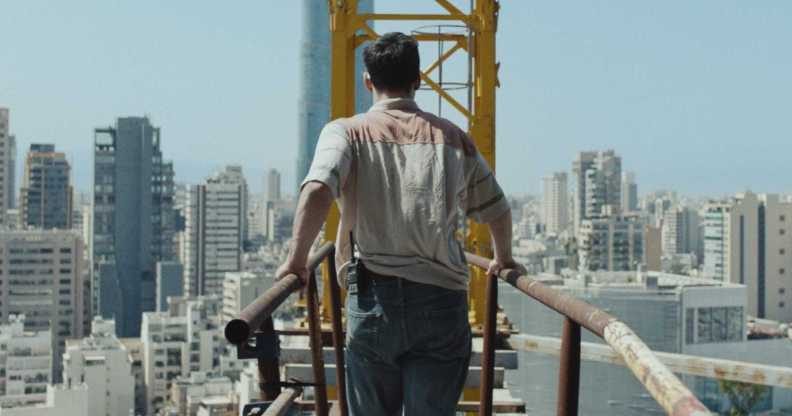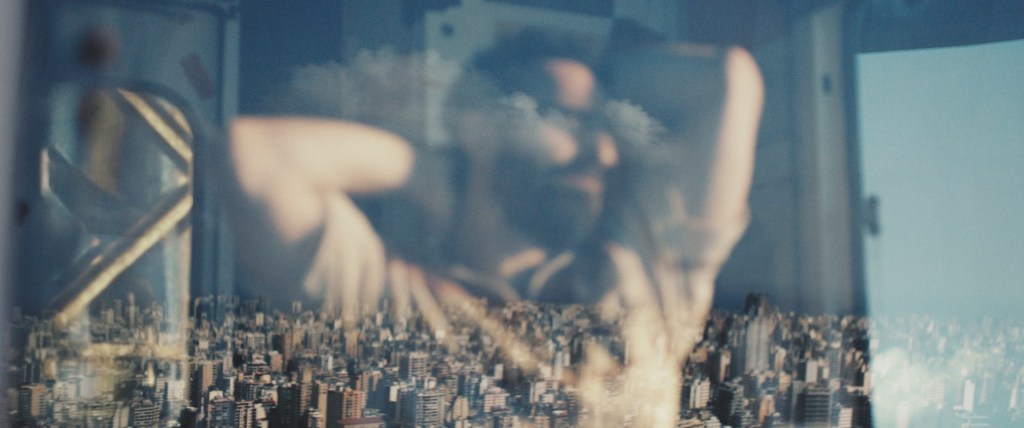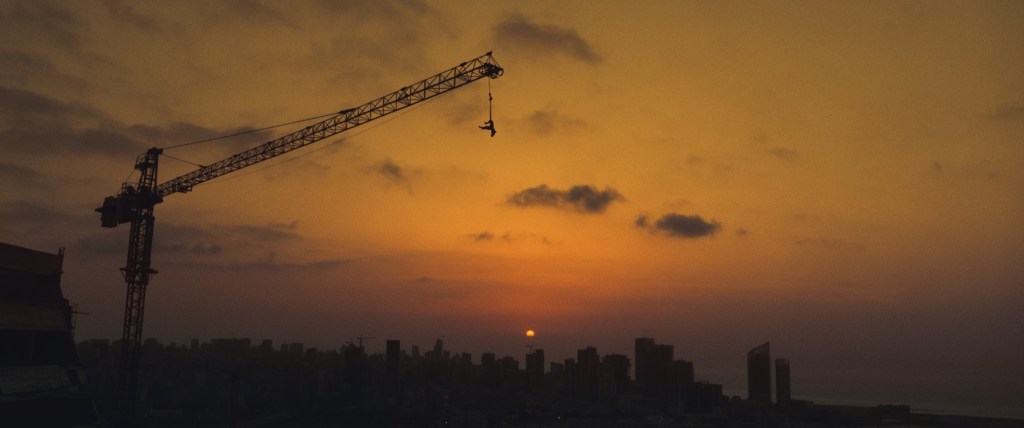Dancer performs death-defying routine at top of Beirut crane in powerful short film

Khansa stars as immigrant worker Mohammed who fantasises while at the top of the most dangerous crane in Beirut (Supplied)
Warsha explores the freedom that immigrant construction worker Mohammad feels when he’s at the top of the tallest, most dangerous crane in Beirut.
The 15-minute short follows Mohammad (played by Lebanese dancer, musician and artist Khansa) as he volunteers to take over the role of crane operator following the mysterious disappearance of its previous occupant.
To get there, he has to cross a violently rickety bridge and climb to a height beyond the tallest buildings of Beirut.
When he reaches the summit, Mohammad’s imagination runs wild: inspired by a picture of a beautiful female dancer stashed in his pocket, he transforms into a leotarded, beautifully-painted acrobat, swinging from the arm of the crane with death-defying grace and beauty – a freedom only available to him away from solid ground.
Directed by Dania Bdeir, Warsha premiered at the Sundance Film Festival where it won the short film jury award for international fiction. It is now being screened at the Glasgow Short Film Festival on Friday (24 March), where Khansa will also give a rare performance “telling an untold story about the Middle East, and celebrating love, intimacy, eroticism, and the Arab queer identity”.
Ahead of the performance, Khansa spoke to PinkNews about the project’s creative process, working with Bdeir and what it means to have access to the freedom to express yourself.
In your own words, what is Warsha about?
Warsha is about taking all the risks and overcoming fear to find your own voice, your moment, and [the] freedom that’s been stripped away from you. It’s there, but you cannot access it, because of all the obstructions that block your way.
At its core, it’s about crossing that bridge and not fearing to cross that bridge, so that you can experience what true freedom feels like, and getting as close as possible to your true self. It’s kind of like reaching that transcendent state of being.
When Mohammad is fantasising that he’s performing, that is a spiritual experience. We use circus to get us there in the film, but we used that to contrast with the structure (of the crane) that is used to carry heavy stuff and to lock things together.
He wants to be Cher or Madonna, but it’s beyond that – it’s something godly, something divine.

Your work focuses a lot on redefining masculinity within the Middle East. What was it that drew you to this project?
I found a lot of similarities with Mohammad. Throughout the whole process of working on the character and his inner monologue, I looked at it as though it was me in an alternative world. We share different circumstances and we come from different backgrounds, but we both deal with the same problems when it comes to privacy, when it comes to identity and the fact that you have to hide who you are.
It was an interesting challenge. I really wanted to go into it and explore him further to better understand who I am as a person and individual. [Connecting] with the character helped me go back in my own history and face those feelings I failed to deal with as a child. It was therapy for me.
It helped me get to a closure with some things in my daily life, my relationship with family, my relationship with my conservative community.
The experience and success of the film has changed a lot of perspectives of people around me, especially those who were not very supportive of what I was doing before. It’s really helped with a lot of things.
What was it like working with Dania Bdeir and how much creative freedom did she give you?
The beauty of this project is that it wasn’t just an actor and a director: it was an artist and storytellers.
We’d just play around, researching, coming up with ideas that were as ambitious as possible, taking those risks, risking both our lives to go up a crane together and filming a trailer with no permits or health insurance.
The energy and dedication that we put in was mutual. There was a constant creative flow of ideas, thoughts, writings, references, videos to explore. And at the same time, we were building something.
She worked in a sense that preserves my identity. She said: “I have Khansa in this film. How can I work with Khansa rather than just Mohammad on this?” We learned from each other. It was a fascinating process.

What do you think audiences can learn from watching Warsha, with regards to playing with their gender identity?
It is the beauty of freedom. Who you become, when you practice who you truly are, when you embrace who you truly are, everything you feel from the inside. And when you do what your gut tells you to do. And without any boundaries, or any threats around.
Leaving all the fear behind, crossing the bridge as a new self, will spark something great inside of you. And that’s what Mohammad finds there.
When you look at that performance, it’s a message to everyone to do the same: to perform and to let go, to embrace that freedom that they are afraid to go for, because of whatever constructs are there.
Put those aside and enjoy that feeling. Because it’s wonderful. It’s ecstatic. It takes you to a place that’s the closest we can get to the divine.
Mohammad is risking his life and playing with death, but at the same time, he’s performing up there. It feels genuine to his body, and his mind thinks that is what he should be doing. That gives him freedom.
Khansa will appear in a special performance ahead of a screening of Warsha at the Glasgow Short Film Festival on Friday (24 March).

